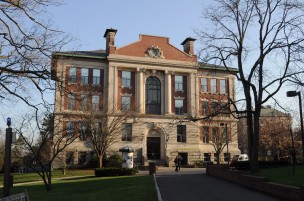
The Patricelli Center for Social Entrepreneurship (PCSE) hosted an event for students that addressed how to navigate accounting terminology on Tuesday, Oct. 14. The lecture, called, “Speaking the Language: What You Need to Know About Finance and Accounting,” featured Carl Byers ’93, who is currently an Adjunct Lecturer in Public Policy at the Kennedy School of Government at Harvard University and a Venture Partner at Fidelity Biosciences.
At the beginning of the event, Byers distributed an “Accounting Vocabulary” list of 18 terms and their definitions and an “Accounting Grammar” list of 10 concepts and their meanings. The terms included “accounts payable,” “historical cost,” and “revenue,” while the concepts included “accounting equation,” “accrual method,” and “recognition v. realization.”
Through his interactive presentation, which combined expository information with personal narratives, Byers taught students tangible skills, such as how to read a balance sheet, how to analyze an income statement, and how to utilize financial language.
In an email to The Argus, Directior of the PCSE Makaela Kingsley ’98 explained why the PCSE emphasizes this type of education.
“Events like this are important at Wesleyan because they offer real-world training that complements the critical thinking and liberal arts background that students develop in the classroom, and the experiential learning that occurs through their extra-curricular activities,” Kingsley wrote.
As an undergraduate at Wesleyan, Byers was initially interested in politics, and he took time off to campaign for Bill Clinton in 1992. His focus on finance emerged later in his academic career. Byers explained what originally drove him to study business.
“I discovered that business could actually be interesting,” Byers said. “I grew up with two research professor parents who taught me that business was boring and evil, so I never even looked at it, but I did a fellowship at University of Chicago while I was here at Wesleyan, over the summer. After I graduated, I went to New York and worked in management consulting for a few years, and I really enjoyed that, but again, I had a fear of ‘What if I become a cog in the corporate wheel with MBA debt and stuff like that?’”
Next, Byers and his wife moved to Boston, where they planned to stay for a month.
“That one month became one year, and that one year became 12 and a half years,” Byers said.
In Boston, Byers became the Chief Financial Officer at athenahealth, a thriving healthcare technology company that went public in 2007.
After taking a sabbatical with his family in Chile, Byers moved backed to Boston and switched from the entrepreneurial side of business to the investment side. He continues to work as a venture capitalist, investing in healthcare information technology.
Byers was a College of Social Studies major at Wesleyan. He believes that both the University and CSS shaped his career path.
“I think I learned the benefits of taking different subjects and blending them together, so my career has been similarly interdisciplinary,” Byers said. “The thing I actually learned how to do at Wesleyan, and I give CSS a lot of credit for this, is how to quickly process a lot of information about a certain subject, and come up with a coherent point of view…. Throughout Wesleyan there’s this value on intellectual curiosity and this interest in helping people come up with a coherent argument that’s really helpful in the so-called ‘real world.’”
Katya Sapozhnina ’16, founder and president of the University’s Entrepreneurship Society and Peer Advisor for the Patricelli Center, stated the importance of business and the lack of formal opportunity for it at the University.
“I believe entrepreneurship is a valuable subject for everybody at Wesleyan to learn,” Sapozhnina said. “Wesleyan students are worldly, caring, and creative. I realized that those characteristics make for great entrepreneurs…. It sucks that Wesleyan does not have a business or finance major. So many people complain about the lack of classes relating to business and finance that are taught by professionals…. The Patricelli Center mainly focuses on social change and therefore there still [exists] that gap for a center focused on all types of entrepreneurship and business.”
Byers also asserted that the PCSE serves an important role on campus.
“If you have a vision to start a new type of organization, whether it’s a business or an NGO or some other type of organization, there are some very practical things you have to learn and there’s a different type of work you have to engage in with other people that is distinct from academic work,” Byers said. “That’s the need that it fills.”
Kingsley agreed with this description of the role of the PCSE.
“The Patricelli Center for Social Entrepreneurship seeks to address this demand for practical skills with group workshops and one-on-one advising/mentoring,” Kingsley wrote. “In the past, we have hosted sessions on building websites, writing a business plan, data-driven decision making, legal structures for social ventures, data visualization, and more.”
Byers stressed that the language of accounting is a particularly important topic for students interested in startups.
“There are a lot of people who understand intuitively the financial concepts around an organization, but they don’t know the specific vocabulary and syntax to be understood in a business context,” Byers said. “I approach teaching finance to entrepreneurs as if it were a language you’re trying to learn, where the terms have specific meanings.”


Leave a Reply